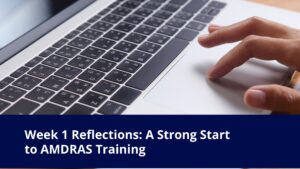
Week 1 Reflections: A Strong Start to AMDRAS Training
Even a marketing director can learn to mediate.By Roanna, a student on the AMDRAS course. So here we are — one week into AMDRAS (Australian
No matter where people interact, there will always be disagreements and disputes to resolve at some point.
It isn’t inevitable that these disputes turn into conflict. Often people use the words dispute and conflict interchangeably, but we see a distinction between the two.
You can have a dispute with someone about something but still have a primarily functional relationship. Separated parents working together for their child’s benefit but cannot reach an agreement about a property settlement would be an example of people who have a dispute.
Another set of parents who are constantly fighting with each other, even in front of the children, without worrying about the consequences on their child, would conflict with each other. The desire to punish or to win at all costs is common when people (or countries) get in conflict with each other.
The next step is war, where combatants’ approach to human rights, decency and the sanctity of life become more flexible. They excuse themselves to behave in ways they would not consider acceptable if they were at peace.

Even a marketing director can learn to mediate.By Roanna, a student on the AMDRAS course. So here we are — one week into AMDRAS (Australian

Mediation Institute FDRP Supervision and Support panel is designed to improve visibility for professional FDR supervisors and make establishing supervision relationships easier.

The new FDR Regs 2025 – Family Law (Family Dispute Resolution Practitioners) Regulations 2025 are now in effect from the 1st April 2025. Find out more.
It is believed that people have an inherent suspicion of those who are different to them, but that evolutionary legacy is easily overcome through understanding and acceptance of difference.
It is also very common for people to compete with others to get what they want in life and be defensive about their rights, space, things, resources and opportunities. We also make decisions based on our emotions that, at times, are not the most rational, causing problems in relationships or leading to disputes.
One of the standard drivers for people is a sense of fairness. High emotion and a sense of what is fair often see people going to a lawyer and ending up in court with little or no real consideration of other options to resolve the dispute or conflict without resorting to asking a judge to resolve the dispute for them.
Competitive sports, adversarial political systems and other social constructs all contribute to the belief that some hold that the only way to resolve a dispute is to get a judge to make a judgement.
If you are considering going to court, do you secretly think it will be like going to Judge Judy’s courtroom? You get to tell the judge what a terrible person the other person is; the judge will tell them off and then find in your favour. It isn’t like that.
Going to court with legal representation will cost tens of thousands of dollars or more. In most parts of Australia, you must show a lawyer you have the funds available to fight a legal battle by putting $10,000 to $15,000 in their trust fund to get started with a court action.
This will not be enough to see you through in most cases unless the lawyers can negotiate a resolution early in the process.
Going to court should not be the first option that you try. There are dispute resolution professionals available who can assist you through alternative dispute resolution (ADR) to solve problems, resolve disputes and reach an acceptable agreement with which you can both live.
Sometimes people get so caught up in the emotion of the battle with their former partner, former business partner, neighbour or whoever it is that they are in conflict that they seem to stop considering alternatives. They don’t realise that no “win” they might get will justify the time and money spent in its pursuit. In the civil courts, especially the “win” is often not very satisfying to either or if substantially what one side wants, the other will often not comply. This leaves them throwing away more money they can no longer afford to waste trying to get the court to make someone do something they don’t want.
In Australia’s family courts, only about 15% of cases make it to a final trial. The rest drop out of the system when all the money is spent, or they find a solution to the dispute themselves through the process, sometimes with the help of interim orders.
Mediation Institute acknowledges the Traditional Owners of country throughout Australia and recognises their continuing connection to land, waters and community. We pay our respect to first nations peoples their cultures, and to the Elders past, present and emerging.
Be aware of cyber fraud. You should contact our office immediately if you receive any email suggesting that the back account details on an invoice have changed, even if that email appears to have been sent from our company.
Our Vocational Training is delivered in partnership with Inspiritive Pty Ltd RTO Code 21178
Mediation Institute Pty Ltd PO Box 16, Loch Sport Victoria, 3851
Tel: 1300 781 533
ABN 43 166 175 962 | NZBN 94 290 510 103 00